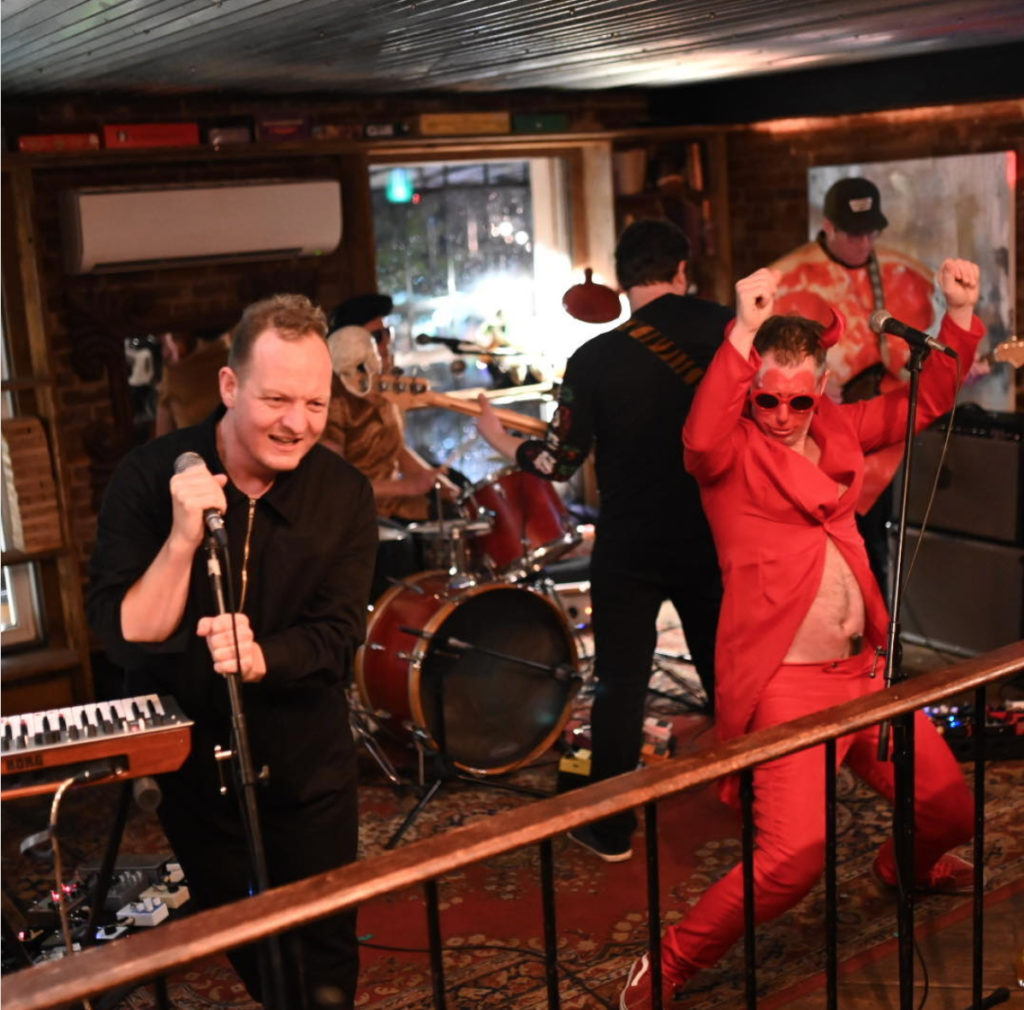Young Satan himself responds to Grid City Magazine’s October 28 feature – What’s the deal with Young Satan in Love?

Dear Editor,
I enjoyed your recent article about us, especially where it had to do with how we are perceived – by you in particular, but I suspect more generally as well. I’m also grateful that your reflections have in turn inspired me to reflect a little more deliberately on what it is we do – what the deal is, as you say. And so I offer the following thoughts to clarify, or at least complicate in fun ways, some widely shared impressions.
Let’s start with the impression that we don’t always know what we are doing. I get that. Apart from the music itself, much else happening at a Young Satan in Love show may not come off as well (at all?) rehearsed. I would say however that we do know what we are doing to the extent that we are exploring what happens when you let go of the illusion of ever really knowing what you are doing.
But that’s just for starters. We’re also exploring whether what passes for “woke” is just a joke. We’re exploring whether the masks we wear on stage are freedom or constraint and whether it even matters so long as you’re having fun. We’re exploring whether extending the stage across an entire venue empowers or eviscerates an audience (as you’ve indicated, it depends on the audience). We’re exploring how clichés and jingoism can be used against themselves. And most importantly, we’re exploring what it means to give the gift of play back to the child you once were.
So I’d say knowing is overrated at best and misdirection at worst. As the Serpent in the Garden, old St. John of the Cross, and new St. Elon of the Musk never tire of reminding us: if you want to come to a knowledge you have not, you must go by a way you know not. Call it shifty, call it shamanic, call it a farce – call it whatever you want – nothing other than repetition, real or imagined, knows itself, and then that’s all it knows. Strange notions made flesh are the very heart of disruption. In disruption are new worlds made and old ones undone.
In the article you also make passing reference to recent release Dancing with a Goblin’s lyrics being tied to the band’s “loopy mythology”. Where I initially considered the reference dismissive, I now see it as an opening, because you’re right. We’re nothing if not a loopy mythology.
But what does this really imply?
All we’ve ever done – the bachelorette partying, yogic flying, hot dog transubstantiation, cigarette piñata as golden calving, clown clobbering, guerilla product endorsement, poutine weaponizing,, business suit alterations as Rapture– is self mythologize. From what I can tell, this is something everyone does, though not always consciously, this mashing and recasting of the raw materials of life as rarified epics. It’s just that, in our case, while straddling the world from “the very tip of Mt Olympus” like a colossus in cut offs, we’ve gloriously showered the huddled, oft befuddled masses with the confetti of our and their own wish fulfillment.
The real and the imagined are always looping in and out of one another. This is as true for Earth Angels as it is for Young Satan in Love. The real question is whether you own your loop or your loop owns you; are you writing the story of your life or are you reading it? I like to think Young Satan in Love is writing the myth of our own myth making, but who knows. Maybe it’s writing us.
Let me close by addressing the lyrics in particular and lyrics generally: How many times have you or I heard people say they don’t pay attention to lyrics, any lyrics? Too many times to count, I’d wager. And no wonder. Apart from old blues, the Great American Songbook, the odd folk or indie revival of special note, and certain pockets of hip hop, lyrics in North American English language music are most often in songs because they have to be, not because they want to be.
I won’t speculate on the reasons for this here, but I will say that the words in our songs very much want to be there. They precede the music. The melodies spring from incantations, prayers, and punch lines I tell myself to ward off demons in the night, or else to summon them to battle. When I sing “The years have not been kind / time to bump and grind”, or else Zeb asks “Do you think it’s weird I want to paint the sky / Why not be like you, just get by and die?”, this isn’t messing around. This is boots on the ground.
Thanks for the opportunity to lay down a few choice tracks in the late fall snow of wonder and woe, and expect further looping of your reality and ours the next time a ¾ hour revival drops in your vicinity.
See you in you know where,
S’tan, Esq.

Related: What’s the deal with Young Satan in Love?
Are they a comedy act, the weirdest band you’ll ever see or are they one of the most underrated rock bands in New Brunswick? It’s anyone’s guess, but their ability to entertain can never be called into question.




